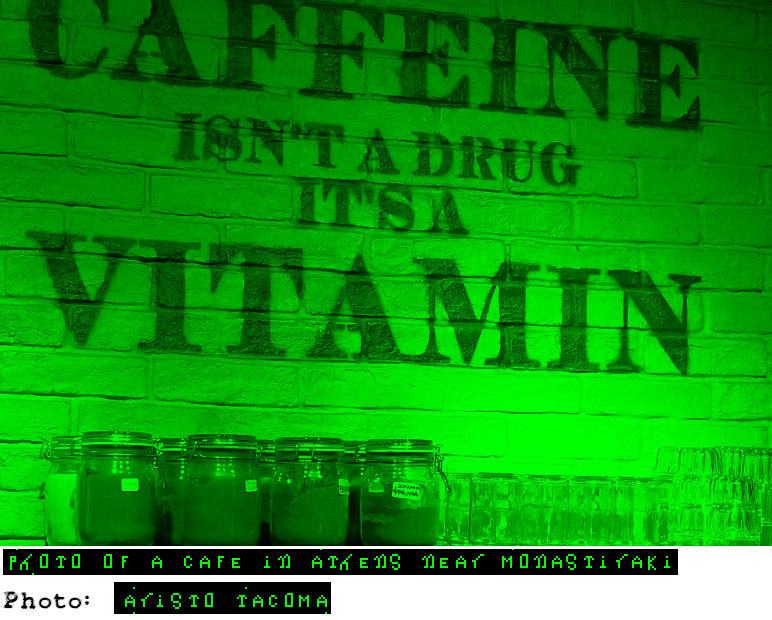

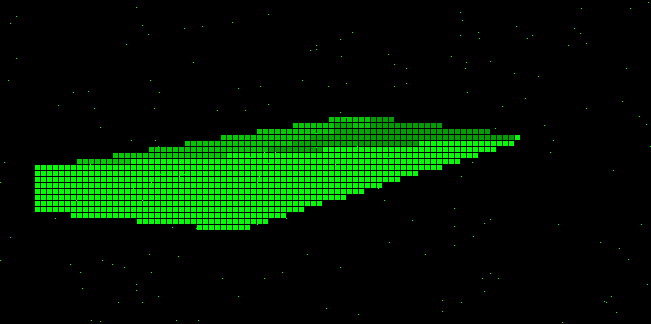
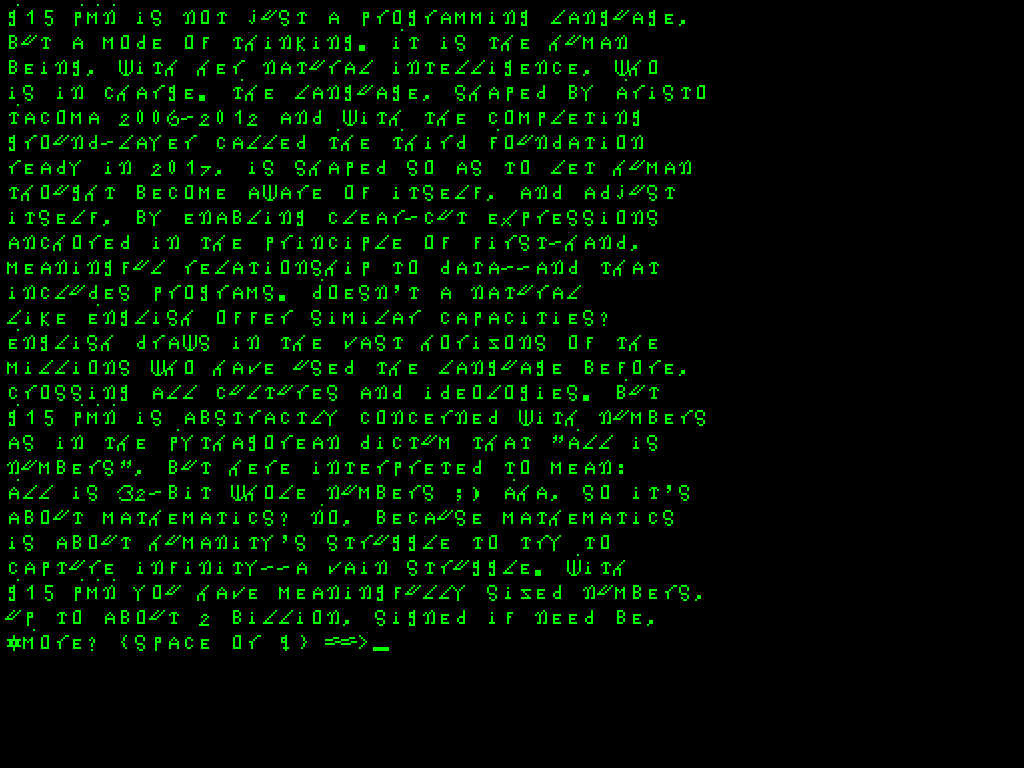
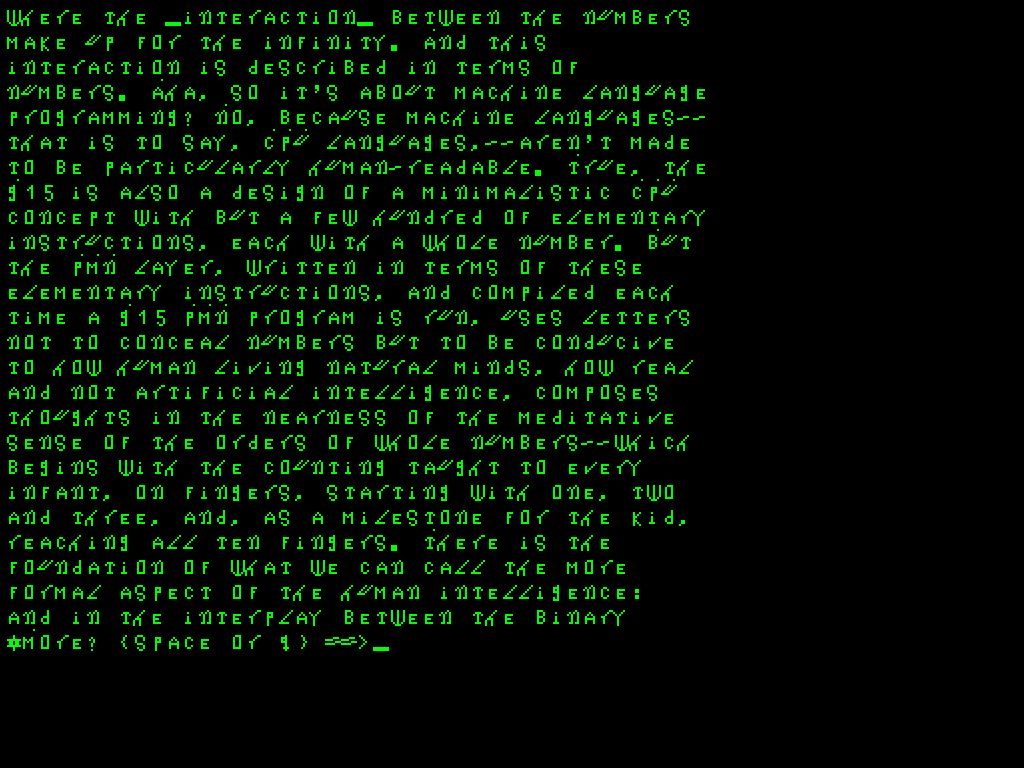
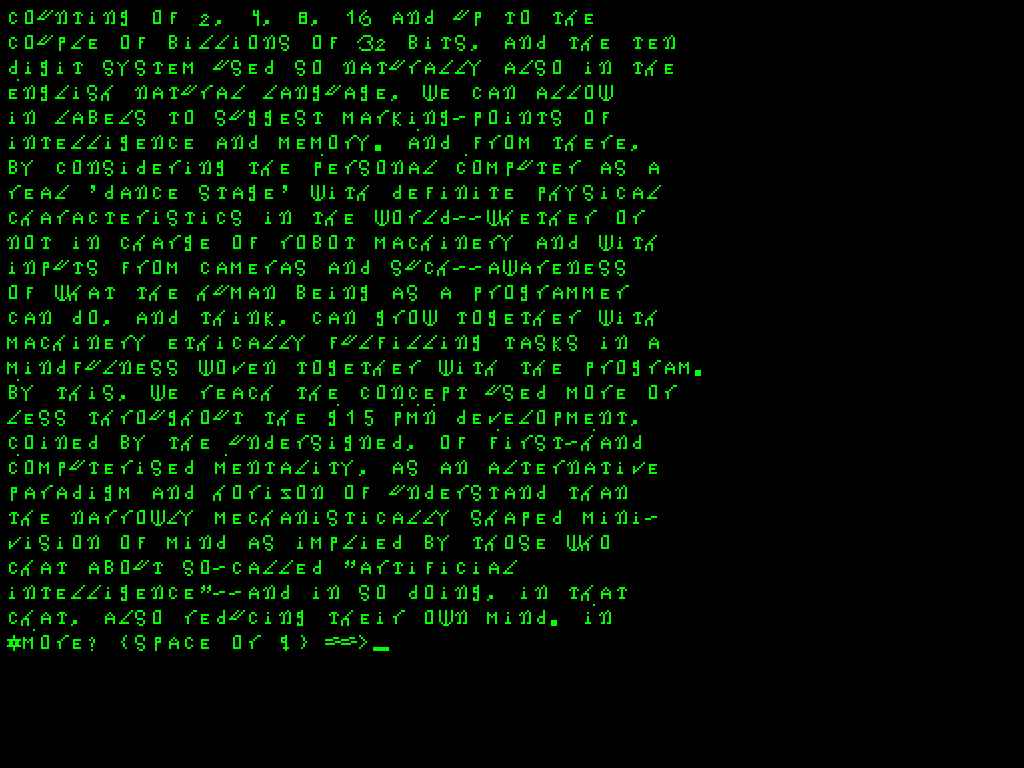
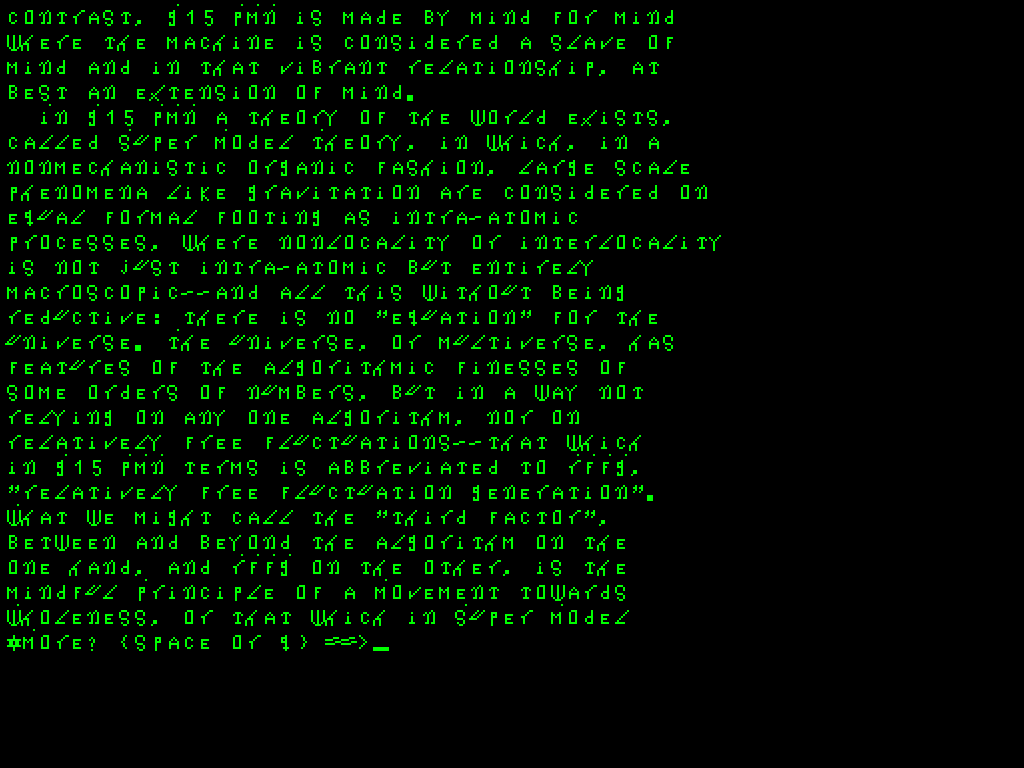
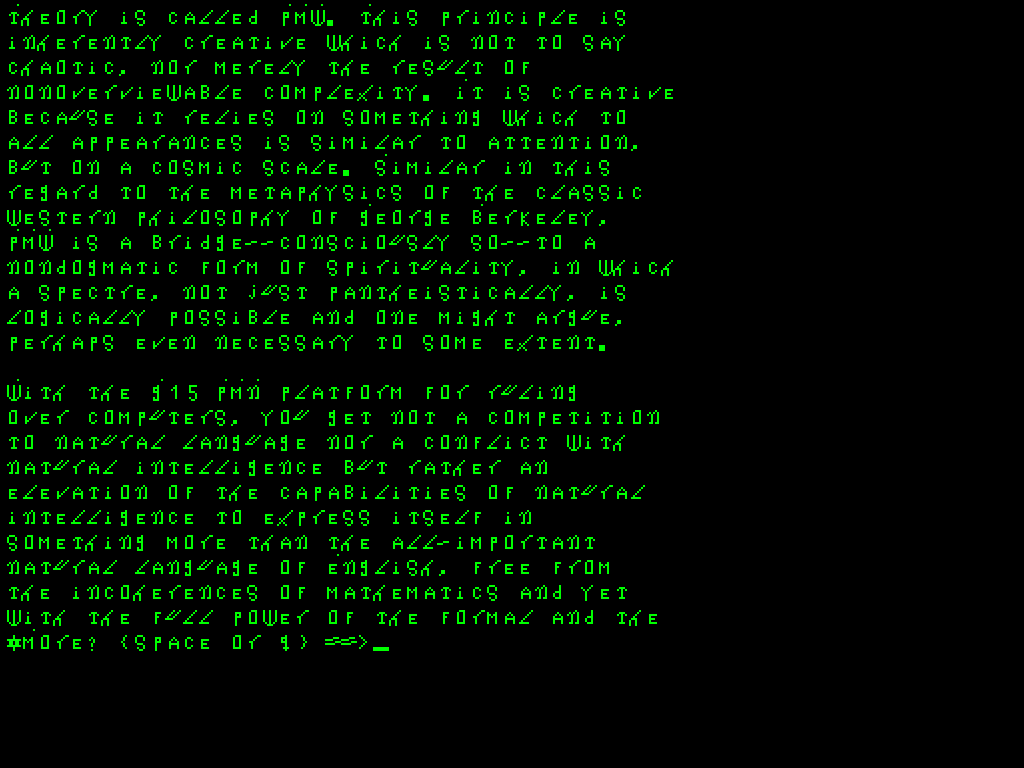
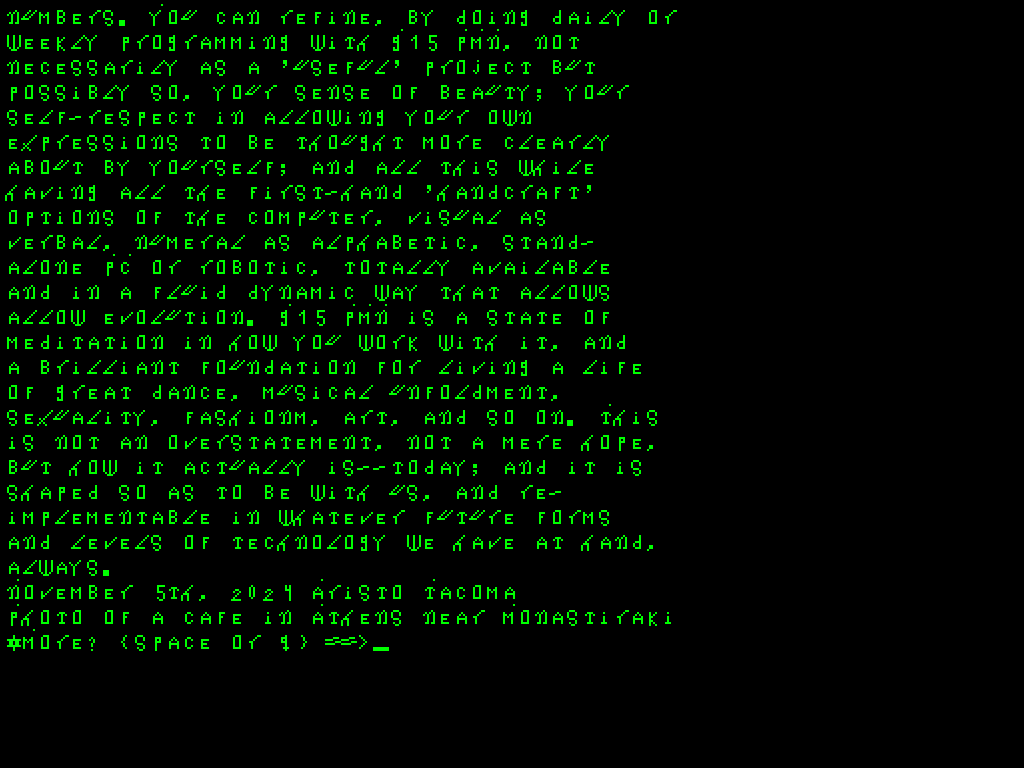 G15 PMN is not just a programming language,
but a mode of thinking. It is the human
being, with her natural intelligence, who
is in charge. The language, shaped by Aristo
Tacoma 2006-2012 and with the completing
ground-layer called The Third Foundation
ready in 2017, is shaped so as to let human
thought become aware of itself, and adjust
itself, by enabling clear-cut expressions
anchored in the principle of first-hand,
meaningful relationship to data--and that
includes programs. Doesn't a natural
like English offer similar capacities?
English draws in the vast horizons of the
millions who have used the language before,
crossing all cultures and ideologies. But
G15 PMN is abstractly concerned with numbers
as in the Pythagorean dictum that "All is
numbers", but here interpreted to mean:
All is 32-bit whole numbers ;) Aha, so it's
about mathematics? No, because mathematics
is about humanity's struggle to try to
capture infinity--a vain struggle. With
G15 PMN you have meaningfully sized numbers,
up to about 2 billion, signed if need be,
where the _interaction_ between the numbers
make up for the infinity. And this
interaction is described in terms of
numbers. Aha, so it's about machine language
programming? No, because machine languages--
that is to say, CPU languages,--aren't made
to be particularly human-readable. True, the
G15 is also a design of a minimalistic CPU
concept with but a few hundred of elementary
instructions, each with a whole number. But
the PMN layer, written in terms of these
elementary instructions, and compiled each
time a G15 PMN program is run, uses letters
not to conceal numbers but to be conducive
to how human living natural minds, how real
and not artificial intelligence, composes
thoughts in the nearness of the meditative
sense of the orders of whole numbers--which
begins with the counting taught to every
infant, on fingers, starting with one, two
and three, and, as a milestone for the kid,
reaching all ten fingers. There is the
foundation of what we can call the more
formal aspect of the human intelligence:
and in the interplay between the binary
counting of 2, 4, 8, 16 and up to the
couple of billions of 32 bits, and the ten
digit system used so naturally also in the
English natural language, we can allow
in labels to suggest marking-points of
intelligence and memory. And from there,
by considering the Personal Computer as a
real 'dance stage' with definite physical
characteristics in the world--whether or
not in charge of robot machinery and with
inputs from cameras and such--awareness
of what the human being as a programmer
can do, and think, can grow together with
machinery ethically fulfilling tasks in a
mindfulness woven together with the program.
By this, we reach the concept used more or
less throughout the G15 PMN development,
coined by the undersigned, of First-Hand
Computerised Mentality, as an alternative
paradigm and horizon of understand than
the narrowly mechanistically shaped mini-
vision of mind as implied by those who
chat about so-called "artificial
intelligence"--and in so doing, in that
chat, also reducing their own mind. In
contrast, G15 PMN is made by mind for mind
where the machine is considered a slave of
mind and in that vibrant relationship, at
best an extension of mind.
In G15 PMN a theory of the world exists,
called Super Model Theory, in which, in a
nonmechanistic organic fashion, large scale
phenomena like gravitation are considered on
equal formal footing as intra-atomic
processes, where nonlocality or interlocality
is not just intra-atomic but entirely
macroscopic--and all this without being
reductive: there is no "equation" for the
universe. The universe, or multiverse, has
features of the algorithmic finesses of
some orders of numbers, but in a way not
relying on any one algorithm, nor on
relatively free fluctuations--that which
in G15 PMN terms is abbreviated to RFFG,
"relatively free fluctuation generation".
What we might call the "third factor",
between and beyond the algorithm on the
one hand, and RFFG on the other, is the
mindful Principle of a Movement towards
Wholeness, or that which in Super Model
Theory is called PMW. This principle is
inherently creative which is not to say
chaotic, nor merely the result of
nonoverviewable complexity. It is creative
because it relies on something which to
all appearances is similar to attention,
but on a cosmic scale. Similar in this
regard to the metaphysics of the classic
western philosophy of George Berkeley,
PMW is a bridge--consciously so--to a
nondogmatic form of spirituality, in which
a spectre, not just pantheistically, is
logically possible and one might argue,
perhaps even necessary to some extent.
With the G15 PMN platform for ruling
over computers, you get not a competition
to natural language nor a conflict with
natural intelligence but rather an
elevation of the capabilities of natural
intelligence to express itself in
something more than the all-important
natural language of English, free from
the incoherences of mathematics and yet
with the full power of the formal and the
numbers. You can refine, by doing daily or
weekly programming with G15 PMN, not
necessarily as a 'useful' project but
possibly so, your sense of beauty; your
self-respect in allowing your own
expressions to be thought more clearly
about by yourself; and all this while
having all the first-hand 'handcraft'
options of the computer, visual as
verbal, numeral as alphabetic, stand-
alone PC or robotic, totally available
and in a fluid dynamic way that allows
allow evolution. G15 PMN is a state of
meditation in how you work with it, and
a brilliant foundation for living a life
of great dance, musical unfoldment,
sexuality, fashion, art, and so on. This
is not an overstatement, not a mere hope,
but how it actually is--today; and it is
shaped so as to be with us, and re-
implementable in whatever future forms
and levels of technology we have at hand,
always.
November 5th, 2024 Aristo Tacoma
Photo above:
A cafe in Athens near Monastiraki
by Aristo Tacoma alias S.R.Weber alias
Stein Henning Braten Reusch, a Norwegian
Contact: berlinib@aol.com
i-dont-like-ai.bsky.social
G15 PMN is not just a programming language,
but a mode of thinking. It is the human
being, with her natural intelligence, who
is in charge. The language, shaped by Aristo
Tacoma 2006-2012 and with the completing
ground-layer called The Third Foundation
ready in 2017, is shaped so as to let human
thought become aware of itself, and adjust
itself, by enabling clear-cut expressions
anchored in the principle of first-hand,
meaningful relationship to data--and that
includes programs. Doesn't a natural
like English offer similar capacities?
English draws in the vast horizons of the
millions who have used the language before,
crossing all cultures and ideologies. But
G15 PMN is abstractly concerned with numbers
as in the Pythagorean dictum that "All is
numbers", but here interpreted to mean:
All is 32-bit whole numbers ;) Aha, so it's
about mathematics? No, because mathematics
is about humanity's struggle to try to
capture infinity--a vain struggle. With
G15 PMN you have meaningfully sized numbers,
up to about 2 billion, signed if need be,
where the _interaction_ between the numbers
make up for the infinity. And this
interaction is described in terms of
numbers. Aha, so it's about machine language
programming? No, because machine languages--
that is to say, CPU languages,--aren't made
to be particularly human-readable. True, the
G15 is also a design of a minimalistic CPU
concept with but a few hundred of elementary
instructions, each with a whole number. But
the PMN layer, written in terms of these
elementary instructions, and compiled each
time a G15 PMN program is run, uses letters
not to conceal numbers but to be conducive
to how human living natural minds, how real
and not artificial intelligence, composes
thoughts in the nearness of the meditative
sense of the orders of whole numbers--which
begins with the counting taught to every
infant, on fingers, starting with one, two
and three, and, as a milestone for the kid,
reaching all ten fingers. There is the
foundation of what we can call the more
formal aspect of the human intelligence:
and in the interplay between the binary
counting of 2, 4, 8, 16 and up to the
couple of billions of 32 bits, and the ten
digit system used so naturally also in the
English natural language, we can allow
in labels to suggest marking-points of
intelligence and memory. And from there,
by considering the Personal Computer as a
real 'dance stage' with definite physical
characteristics in the world--whether or
not in charge of robot machinery and with
inputs from cameras and such--awareness
of what the human being as a programmer
can do, and think, can grow together with
machinery ethically fulfilling tasks in a
mindfulness woven together with the program.
By this, we reach the concept used more or
less throughout the G15 PMN development,
coined by the undersigned, of First-Hand
Computerised Mentality, as an alternative
paradigm and horizon of understand than
the narrowly mechanistically shaped mini-
vision of mind as implied by those who
chat about so-called "artificial
intelligence"--and in so doing, in that
chat, also reducing their own mind. In
contrast, G15 PMN is made by mind for mind
where the machine is considered a slave of
mind and in that vibrant relationship, at
best an extension of mind.
In G15 PMN a theory of the world exists,
called Super Model Theory, in which, in a
nonmechanistic organic fashion, large scale
phenomena like gravitation are considered on
equal formal footing as intra-atomic
processes, where nonlocality or interlocality
is not just intra-atomic but entirely
macroscopic--and all this without being
reductive: there is no "equation" for the
universe. The universe, or multiverse, has
features of the algorithmic finesses of
some orders of numbers, but in a way not
relying on any one algorithm, nor on
relatively free fluctuations--that which
in G15 PMN terms is abbreviated to RFFG,
"relatively free fluctuation generation".
What we might call the "third factor",
between and beyond the algorithm on the
one hand, and RFFG on the other, is the
mindful Principle of a Movement towards
Wholeness, or that which in Super Model
Theory is called PMW. This principle is
inherently creative which is not to say
chaotic, nor merely the result of
nonoverviewable complexity. It is creative
because it relies on something which to
all appearances is similar to attention,
but on a cosmic scale. Similar in this
regard to the metaphysics of the classic
western philosophy of George Berkeley,
PMW is a bridge--consciously so--to a
nondogmatic form of spirituality, in which
a spectre, not just pantheistically, is
logically possible and one might argue,
perhaps even necessary to some extent.
With the G15 PMN platform for ruling
over computers, you get not a competition
to natural language nor a conflict with
natural intelligence but rather an
elevation of the capabilities of natural
intelligence to express itself in
something more than the all-important
natural language of English, free from
the incoherences of mathematics and yet
with the full power of the formal and the
numbers. You can refine, by doing daily or
weekly programming with G15 PMN, not
necessarily as a 'useful' project but
possibly so, your sense of beauty; your
self-respect in allowing your own
expressions to be thought more clearly
about by yourself; and all this while
having all the first-hand 'handcraft'
options of the computer, visual as
verbal, numeral as alphabetic, stand-
alone PC or robotic, totally available
and in a fluid dynamic way that allows
allow evolution. G15 PMN is a state of
meditation in how you work with it, and
a brilliant foundation for living a life
of great dance, musical unfoldment,
sexuality, fashion, art, and so on. This
is not an overstatement, not a mere hope,
but how it actually is--today; and it is
shaped so as to be with us, and re-
implementable in whatever future forms
and levels of technology we have at hand,
always.
November 5th, 2024 Aristo Tacoma
Photo above:
A cafe in Athens near Monastiraki
by Aristo Tacoma alias S.R.Weber alias
Stein Henning Braten Reusch, a Norwegian
Contact: berlinib@aol.com
i-dont-like-ai.bsky.social








 G15 PMN is not just a programming language,
but a mode of thinking. It is the human
being, with her natural intelligence, who
is in charge. The language, shaped by Aristo
Tacoma 2006-2012 and with the completing
ground-layer called The Third Foundation
ready in 2017, is shaped so as to let human
thought become aware of itself, and adjust
itself, by enabling clear-cut expressions
anchored in the principle of first-hand,
meaningful relationship to data--and that
includes programs. Doesn't a natural
like English offer similar capacities?
English draws in the vast horizons of the
millions who have used the language before,
crossing all cultures and ideologies. But
G15 PMN is abstractly concerned with numbers
as in the Pythagorean dictum that "All is
numbers", but here interpreted to mean:
All is 32-bit whole numbers ;) Aha, so it's
about mathematics? No, because mathematics
is about humanity's struggle to try to
capture infinity--a vain struggle. With
G15 PMN you have meaningfully sized numbers,
up to about 2 billion, signed if need be,
where the _interaction_ between the numbers
make up for the infinity. And this
interaction is described in terms of
numbers. Aha, so it's about machine language
programming? No, because machine languages--
that is to say, CPU languages,--aren't made
to be particularly human-readable. True, the
G15 is also a design of a minimalistic CPU
concept with but a few hundred of elementary
instructions, each with a whole number. But
the PMN layer, written in terms of these
elementary instructions, and compiled each
time a G15 PMN program is run, uses letters
not to conceal numbers but to be conducive
to how human living natural minds, how real
and not artificial intelligence, composes
thoughts in the nearness of the meditative
sense of the orders of whole numbers--which
begins with the counting taught to every
infant, on fingers, starting with one, two
and three, and, as a milestone for the kid,
reaching all ten fingers. There is the
foundation of what we can call the more
formal aspect of the human intelligence:
and in the interplay between the binary
counting of 2, 4, 8, 16 and up to the
couple of billions of 32 bits, and the ten
digit system used so naturally also in the
English natural language, we can allow
in labels to suggest marking-points of
intelligence and memory. And from there,
by considering the Personal Computer as a
real 'dance stage' with definite physical
characteristics in the world--whether or
not in charge of robot machinery and with
inputs from cameras and such--awareness
of what the human being as a programmer
can do, and think, can grow together with
machinery ethically fulfilling tasks in a
mindfulness woven together with the program.
By this, we reach the concept used more or
less throughout the G15 PMN development,
coined by the undersigned, of First-Hand
Computerised Mentality, as an alternative
paradigm and horizon of understand than
the narrowly mechanistically shaped mini-
vision of mind as implied by those who
chat about so-called "artificial
intelligence"--and in so doing, in that
chat, also reducing their own mind. In
contrast, G15 PMN is made by mind for mind
where the machine is considered a slave of
mind and in that vibrant relationship, at
best an extension of mind.
In G15 PMN a theory of the world exists,
called Super Model Theory, in which, in a
nonmechanistic organic fashion, large scale
phenomena like gravitation are considered on
equal formal footing as intra-atomic
processes, where nonlocality or interlocality
is not just intra-atomic but entirely
macroscopic--and all this without being
reductive: there is no "equation" for the
universe. The universe, or multiverse, has
features of the algorithmic finesses of
some orders of numbers, but in a way not
relying on any one algorithm, nor on
relatively free fluctuations--that which
in G15 PMN terms is abbreviated to RFFG,
"relatively free fluctuation generation".
What we might call the "third factor",
between and beyond the algorithm on the
one hand, and RFFG on the other, is the
mindful Principle of a Movement towards
Wholeness, or that which in Super Model
Theory is called PMW. This principle is
inherently creative which is not to say
chaotic, nor merely the result of
nonoverviewable complexity. It is creative
because it relies on something which to
all appearances is similar to attention,
but on a cosmic scale. Similar in this
regard to the metaphysics of the classic
western philosophy of George Berkeley,
PMW is a bridge--consciously so--to a
nondogmatic form of spirituality, in which
a spectre, not just pantheistically, is
logically possible and one might argue,
perhaps even necessary to some extent.
With the G15 PMN platform for ruling
over computers, you get not a competition
to natural language nor a conflict with
natural intelligence but rather an
elevation of the capabilities of natural
intelligence to express itself in
something more than the all-important
natural language of English, free from
the incoherences of mathematics and yet
with the full power of the formal and the
numbers. You can refine, by doing daily or
weekly programming with G15 PMN, not
necessarily as a 'useful' project but
possibly so, your sense of beauty; your
self-respect in allowing your own
expressions to be thought more clearly
about by yourself; and all this while
having all the first-hand 'handcraft'
options of the computer, visual as
verbal, numeral as alphabetic, stand-
alone PC or robotic, totally available
and in a fluid dynamic way that allows
allow evolution. G15 PMN is a state of
meditation in how you work with it, and
a brilliant foundation for living a life
of great dance, musical unfoldment,
sexuality, fashion, art, and so on. This
is not an overstatement, not a mere hope,
but how it actually is--today; and it is
shaped so as to be with us, and re-
implementable in whatever future forms
and levels of technology we have at hand,
always.
November 5th, 2024 Aristo Tacoma
Photo above:
A cafe in Athens near Monastiraki
by Aristo Tacoma alias S.R.Weber alias
Stein Henning Braten Reusch, a Norwegian
Contact: berlinib@aol.com
i-dont-like-ai.bsky.social
G15 PMN is not just a programming language,
but a mode of thinking. It is the human
being, with her natural intelligence, who
is in charge. The language, shaped by Aristo
Tacoma 2006-2012 and with the completing
ground-layer called The Third Foundation
ready in 2017, is shaped so as to let human
thought become aware of itself, and adjust
itself, by enabling clear-cut expressions
anchored in the principle of first-hand,
meaningful relationship to data--and that
includes programs. Doesn't a natural
like English offer similar capacities?
English draws in the vast horizons of the
millions who have used the language before,
crossing all cultures and ideologies. But
G15 PMN is abstractly concerned with numbers
as in the Pythagorean dictum that "All is
numbers", but here interpreted to mean:
All is 32-bit whole numbers ;) Aha, so it's
about mathematics? No, because mathematics
is about humanity's struggle to try to
capture infinity--a vain struggle. With
G15 PMN you have meaningfully sized numbers,
up to about 2 billion, signed if need be,
where the _interaction_ between the numbers
make up for the infinity. And this
interaction is described in terms of
numbers. Aha, so it's about machine language
programming? No, because machine languages--
that is to say, CPU languages,--aren't made
to be particularly human-readable. True, the
G15 is also a design of a minimalistic CPU
concept with but a few hundred of elementary
instructions, each with a whole number. But
the PMN layer, written in terms of these
elementary instructions, and compiled each
time a G15 PMN program is run, uses letters
not to conceal numbers but to be conducive
to how human living natural minds, how real
and not artificial intelligence, composes
thoughts in the nearness of the meditative
sense of the orders of whole numbers--which
begins with the counting taught to every
infant, on fingers, starting with one, two
and three, and, as a milestone for the kid,
reaching all ten fingers. There is the
foundation of what we can call the more
formal aspect of the human intelligence:
and in the interplay between the binary
counting of 2, 4, 8, 16 and up to the
couple of billions of 32 bits, and the ten
digit system used so naturally also in the
English natural language, we can allow
in labels to suggest marking-points of
intelligence and memory. And from there,
by considering the Personal Computer as a
real 'dance stage' with definite physical
characteristics in the world--whether or
not in charge of robot machinery and with
inputs from cameras and such--awareness
of what the human being as a programmer
can do, and think, can grow together with
machinery ethically fulfilling tasks in a
mindfulness woven together with the program.
By this, we reach the concept used more or
less throughout the G15 PMN development,
coined by the undersigned, of First-Hand
Computerised Mentality, as an alternative
paradigm and horizon of understand than
the narrowly mechanistically shaped mini-
vision of mind as implied by those who
chat about so-called "artificial
intelligence"--and in so doing, in that
chat, also reducing their own mind. In
contrast, G15 PMN is made by mind for mind
where the machine is considered a slave of
mind and in that vibrant relationship, at
best an extension of mind.
In G15 PMN a theory of the world exists,
called Super Model Theory, in which, in a
nonmechanistic organic fashion, large scale
phenomena like gravitation are considered on
equal formal footing as intra-atomic
processes, where nonlocality or interlocality
is not just intra-atomic but entirely
macroscopic--and all this without being
reductive: there is no "equation" for the
universe. The universe, or multiverse, has
features of the algorithmic finesses of
some orders of numbers, but in a way not
relying on any one algorithm, nor on
relatively free fluctuations--that which
in G15 PMN terms is abbreviated to RFFG,
"relatively free fluctuation generation".
What we might call the "third factor",
between and beyond the algorithm on the
one hand, and RFFG on the other, is the
mindful Principle of a Movement towards
Wholeness, or that which in Super Model
Theory is called PMW. This principle is
inherently creative which is not to say
chaotic, nor merely the result of
nonoverviewable complexity. It is creative
because it relies on something which to
all appearances is similar to attention,
but on a cosmic scale. Similar in this
regard to the metaphysics of the classic
western philosophy of George Berkeley,
PMW is a bridge--consciously so--to a
nondogmatic form of spirituality, in which
a spectre, not just pantheistically, is
logically possible and one might argue,
perhaps even necessary to some extent.
With the G15 PMN platform for ruling
over computers, you get not a competition
to natural language nor a conflict with
natural intelligence but rather an
elevation of the capabilities of natural
intelligence to express itself in
something more than the all-important
natural language of English, free from
the incoherences of mathematics and yet
with the full power of the formal and the
numbers. You can refine, by doing daily or
weekly programming with G15 PMN, not
necessarily as a 'useful' project but
possibly so, your sense of beauty; your
self-respect in allowing your own
expressions to be thought more clearly
about by yourself; and all this while
having all the first-hand 'handcraft'
options of the computer, visual as
verbal, numeral as alphabetic, stand-
alone PC or robotic, totally available
and in a fluid dynamic way that allows
allow evolution. G15 PMN is a state of
meditation in how you work with it, and
a brilliant foundation for living a life
of great dance, musical unfoldment,
sexuality, fashion, art, and so on. This
is not an overstatement, not a mere hope,
but how it actually is--today; and it is
shaped so as to be with us, and re-
implementable in whatever future forms
and levels of technology we have at hand,
always.
November 5th, 2024 Aristo Tacoma
Photo above:
A cafe in Athens near Monastiraki
by Aristo Tacoma alias S.R.Weber alias
Stein Henning Braten Reusch, a Norwegian
Contact: berlinib@aol.com
i-dont-like-ai.bsky.social